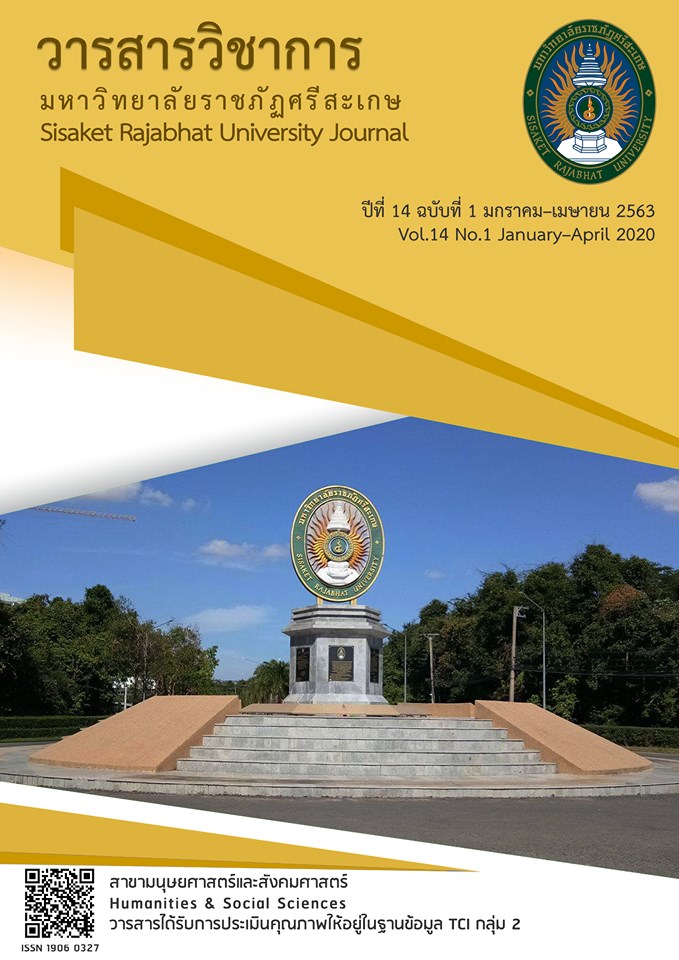การพัฒนาผลสัมฤทธิ์ทางการเรียนชีววิทยาและการคิดแก้ปัญหาของนักเรียนชั้นมัธยมศึกษาปีที่ 5 โดยการจัดการเรียนรู้ปัญหาเป็นฐาน
Main Article Content
บทคัดย่อ
การวิจัยครั้งนี้มีความมุ่งหมาย 1) เพื่อพัฒนาผลสัมฤทธิ์ทางการเรียนชีววิทยา ให้ผ่านเกณฑ์ร้อยละ 70 2) เพื่อพัฒนาการคิดแก้ปัญหา ให้ผ่านเกณฑ์ร้อยละ 65 โดยการจัดการเรียนรู้ปัญหาเป็นฐาน กลุ่มเป้าหมายที่ใช้ในการวิจัยครั้งนี้เป็นนักเรียนชั้นมัธยมศึกษาปีที่ 5 ที่กำลังศึกษาในรายวิชาชีววิทยา ภาคเรียนที่ 2 ปีการศึกษา 2562 จำนวน 21 คน โรงเรียนเทศบาลบูรพาพิทยาคาร อ.เมือง จ. มหาสารคาม เครื่องมือใช้ในการวิจัย ได้แก่ 1) แผนการจัดการเรียนรู้ปัญหาเป็นฐาน วิชาชีววิทยา เรื่องระบบหมุนเวียนเลือดและระบบขับถ่าย จำนวน 8 แผน เวลา 12 ชั่วโมง 2) แบบทดสอบวัดผลสัมฤทธิ์ทางการเรียนชีววิทยา ชนิดเลือกตอบ 4 ตัวเลือก จำนวน 2 ชุด ชุดละ 20 ข้อ 3) แบบทดสอบการคิดแก้ปัญหาแบบอัตนัย จำนวน 2 ชุด ชุดละ 5 สถานการณ์ 4) แบบสังเกตพฤติกรรมการคิดแก้ปัญหา การวิจัยครั้งนี้ใช้รูปแบบของการวิจัยเชิงปฏิบัติการ ซึ่งมีวงจรการปฏิบัติ 2 วงจร ได้แก่ วงจรปฏิบัติการที่ 1 ใช้แผนการจัดการเรียนรู้ที่ 1-4 วงจรปฏิบัติการที่ 2 ใช้แผนการจัดการเรียนรู้ที่ 5-8 การวิเคราะห์ข้อมูลโดยใช้ค่าเฉลี่ย ร้อยละ ส่วนเบี่ยงเบนมาตรฐาน และนำเสนอข้อมูลเชิงคุณภาพด้วยการพรรณนาวิเคราะห์ ผลการวิจัยพบว่า 1) นักเรียนมีผลสัมฤทธิ์ทางการเรียนชีววิทยา เฉลี่ยร้อยละ 77.38 ซึ่งผ่านเกณฑ์ร้อยละ 70 2) นักเรียนมีคะแนนการคิดแก้ปัญหา เฉลี่ยร้อยละ 67.56 ซึ่งผ่านเกณฑ์ร้อยละ 65 โดยสรุปการจัดการเรียนรู้ปัญหาเป็นฐาน สามารถพัฒนาผลสัมฤทธิ์ทางการเรียนชีววิทยาและการคิดแก้ปัญหาของนักเรียนกลุ่มเป้าหมายได้ ครูผู้สอนจึงสามารถนำการจัดการเรียนรู้ดังกล่าว ไปปรับใช้ให้เหมาะสมกับสถานการณ์การเรียนรู้ของผู้เรียนให้ประสบผลสำเร็จยิ่งขึ้นไป
Article Details
1. เนื้อหาและข้อมูลในบทความที่ลงตีพิมพ์ในวารสารวิชาการมหาวิทยาลัยราชภัฏศรีสะเกษ ถือเป็นข้อคิดเห็นและความรับผิดชอบของผู้เขียนบทความโดยตรง ซึ่งกองบรรณาธิการวารสาร ไม่จำเป็นต้องเห็นด้วย หรือร่วมรับผิดชอบใด ๆ
2. บทความ ข้อมูล เนื้อหา รูปภาพ ฯลฯ ที่ได้รับการตีพิมพ์ในวารสารวิชาการมหาวิทยาลัยราชภัฏศรีสะเกษ กองบรรณาธิการไม่สงวนสิทธิ์ในการคัดลอกบทความเพื่อการศึกษา แต่ให้อ้างอิงแหล่งที่มาให้ครบถ้วนสมบูรณ์
เอกสารอ้างอิง
Chooklin, P. (2014). The Outcome of using Action Research in Developing Problem-Based Learning Activities in The Biology unit on “Chemical Basis of Life” of Mathayom suksa 4 students(Thesis of Master of Education). Khon Kaen: Khon Kaen University. [In Thai]
Dachakupt, P., and Yindeesuk, P. (2010). 21st Educational administration. (1st Edition). Bangkok: Chulalongkorn University. [In Thai]
Gagne, R.M. (1970). The Condition of Learning. New York: Holt Rinchart and Winston.
Hinna, S. (2016). Effect of Problem-Based Learning with Graphic Organizer on Biology Achievement, Analytical Thinking and Instructional Satisfaction of Grade 10 Students(Thesis of Master of Education). Songkla: Prince of Songkla University. [In Thai]
Inthanon, B. (2008). A study on science learning achievement and ability in solving seience problems through problem-based learning and inquiry proeess of Matthayomsuksa 3 students at Yotinbumruny school(Thesis of Master of Education). Srinakharinwirot: Srinakharinwirot University. [In Thai]
Kaewdang, R. (2001). Educational Administration. The Development of Training Program for School Administrators in Basic Education. Bangkok: Rungsilp Printing co., ltd. [In Thai]
Khemmani, T. (2007). The Teaching. Bangkok: Chulalongkorn University Press. [In Thai]
Lakhom, S. (2014). The Development of Grade 8 Students Problem-Solving Ability and Learning Achievement In The Subject of Natural Resources and Environmental Conservation Using Problem-Based Learning(Thesis of Master of Education). Khon Kaen: Khon Kaen University. [In Thai]
Laoriandee, W. (2013). Techniques of learning organization for professional teachers. (12th Edition). Nakhon Pathom: Silpakorn University Publishing(SUP). [In Thai]
Ministry of Education. (2009). The Basic Education Core Curriculum 2008. Bangkok: The Agricultural Cooperative Federation of Thailand Limited. [In Thai]
Mookmalee, K. (2014). Development of Problem Solving Ability and Learning Achievement on Food and Existence for Grade 8 Students by Problem – Based Learning (Thesis of Master of Education). Khon Kaen: Khon Kaen University. [In Thai]
Office of the Education Council. (2007). Problem-Based Learning. Bangkok: The Agricultural Cooperative Federation of Thailand. Limited. [In Thai]
Pongboroboon, Y. (1994). Action Research. Journal of Education . Khon Kaen: Khon Kaen University. [In Thai]
Pongphoka, S. (2014). The development of problem solving thinking ability of mutthayomsuksa 6 students by future problem solving technique and mind mapping(Thesis of Master of Education). Bangkok: Silpakorn University. [In Thai]
Sa-ah, N. (2008). Effects of Problem-Based Learning on Science Achievement, Self-Directed Learning and Satisfaction with Learning of Mathayomsuksa Five Students (Thesis of Master of Education). Songkhla: Prince of Songkla University. [In Thai]
Srisa-ard, B. (2002) Statistics for Educational Research. (2nd Edition). Bangkok: Suviriya Sason Publishing. [In Thai]
Srisacorn, S. (2012). The Development of Problem Solving Ability of Eighth Grade Students Taught by Future Problem Solving Techmique(Thesis of Master of Education). Silpakorn: Silpakorn University. [In Thai]
Sutharat, W. (2010). Thinking and Creative Process. Bangkok: Suviriya Sason Publishing. [In Thai]
Sutthirat, C. (2009). 80 innovation of Student-centered learning. Bangkok: Danex Intercorporation. [In Thai]
Wicheansang, K. (2017). Effect of STEM Education on Chemistry Achievement, Problem Solving Ability and Instructional Satisfaction of Grade 12 Students (Thesis of Master of Education). Songkhla: Prince of Songkla University. [In Thai]
Wongchai, W. (2010). Effects of Problem-Based Learning on Biology Achievement and Instructional Satisfaction of Grade 11 Students(Thesis of Master of Education). Khon Kaen: Khon Kaen University. [In Thai]


